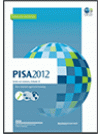This report focuses on the links between maths anxiety, openness to problem solving, perseverance and maths achievement. It presents data which addresses the following areas:
- Maths anxiety, openness to problem solving and perseverance among New Zealand students compared with the OECD average.
- Impact of anxiety, openness to problem solving, and perseverance on maths achievement in New Zealand.
- Differences in anxiety, openness to problem solving, and perseverance evidence by gender, socio-economic background, and ethnicity.
- Changes between 2003 and 2012 in the learning approaches of New Zealand students.
Key Results
- The way students approach learning has a strong impact on maths achievement in New Zealand. When students feel more anxious about doing maths, their math achievement is lower. When students are more willing to engage with problems and more likely to persevere with difficult problems, their maths achievement is higher. The link between these three variables and maths achievement is particularly high in New Zealand compared to other countries participating in PISA 2012.
- New Zealand students reported similar levels of perseverance as the OECD average, but reported lower levels of openness to problem solving and higher levels of anxiety. Since 2003, PISA has shown an increase in maths anxiety among New Zealand students. New Zealand girls had one of the largest increases among participating countries.
- On average, New Zealand boys are more likely than New Zealand girls to be open to problem solving and persevere with problems. Girls, however, are more likely to report higher levels of maths anxiety than boys.
- On average, maths anxiety is particularly high among Māori and Pasifika students. Maths anxiety among Pākehā is close to the OECD average, while anxiety is low among Asian students.
- Asian and Pasifika students report higher levels of perseverance than the OECD average while Pākehā and Māori students report lower levels.
- Openness to problem solving and perseverance had a particularly strong impact on the achievement of Pākehā students.
- Differences in maths anxiety and perseverance between students from socioeconomically advantaged and disadvantaged backgrounds in New Zealand are greater than the differences found in the OECD.

